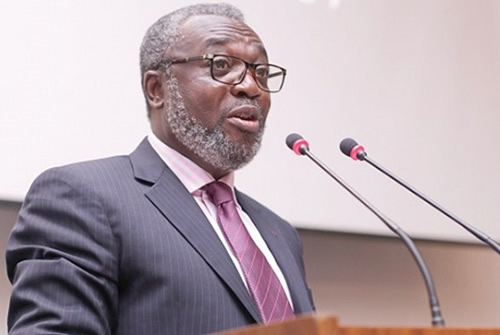Ghana is rolling out E-Tracker to monitor and improve quality care – Nsiah-Asare

Director General of the Ghana Health Service (GHS), has said the Service is rolling out an E-tracker system to monitor Persons Living with HIV who are on Anti-Retroviral Therapy (ART) to improve quality services being rendered.
He said introduction of the E-tracker system, part of institutional reforms by government for all public institutions and that of GHS, will improve on quality, efficiency, and reduce patients’ loss to follow-up in the areas of ART, TB and Maternal, Newborn, Child and Adolescent Health (MNCAH) clients.
“At the community level, a paperless system is being implemented in a phased approach to improve household level HIV response and care, adherence to care, and provision of targeted services to clients (C-tracker).”
Dr Nsiah-Asare said this when he participated in a panel discussion session as part of the ongoing 22 International AIDS Conference at the RAI Convention Centre in Amsterdam, Netherlands.
The session was on the theme: “Ending AIDS Epidemic and Achieving Universal Health Coverage by 2030 in Africa”.
The five-day conference on the theme: “Breaking Barriers, Building Bridges’, is being attended by about 18,000 participants from around the globe including researchers from various disciplines, medical professionals, public health and community practitioners and policy planners.
The AIDS 2018 conference, aims at promoting human rights based and evidence-informed HIV responses designed to meet the needs of the vulnerable communities, which include Persons Living with HIV, displaced populations, men who have sex with men, people in closed settings, people who use drugs, sex workers, transgender people, women and girls and young people as well as collaborate in fighting the disease beyond country borders.
The Director General noted that to ensure that no one was left behind, some critical measures have been put in place to address the issues of Access, Equity, Stigma and Discrimination and Partnership, adding that, it also help ensure that Ghana attained the target of the 90/90/90 and ending AIDS by 2030.
He explained that Ghana has developed a national Viral Load (VL) scale-up plan for 2017-2020 of which three high through-put VL machines have been installed as centres of excellence and MOU signed with a courier service (Ghana Post) for enhanced VL specimen referral and reporting.
Ghana’s health sector leadership has prioritized partnership for research regarding UHC innovations and best practices towards 90-90-90 and global health security.
“UHC is supported by moving health services to the communities, developing sustainable and diverse health cadres and health actions, empowering women and vulnerable populations, and improving health providers, household and community interaction.
“This trajectory to UHC involves systems strengthening, innovations in strategies and programs, prioritization of actions including those on the 90-90-90 HIV targets, and advancing sustainability”.
Since 2005, Ghana has been operating a National Health Insurance Scheme (NHIS), which all residents of Ghana, including non-citizens can subscribe to. The benefit package of the NHIS covers 95 per cent of diagnosed conditions, and it has no cost-sharing requirements. Members pay no out of pocket costs for services or pharmaceuticals based on policy.
Ghana finances its health insurance scheme primarily through value-added tax (VAT) revenue, which creates an implicit subsidy for basic care.
Overtime, NHIS enrolment has expanded and become more equitable. As of 2015, NHIS covered about 42 per cent of the population and we are working to increase the coverage.
Source: GNA
